 (Photo: Jason Doiy/ALM)
(Photo: Jason Doiy/ALM)Will the Trucking Industry Crack the AB5 Code for the Gig Economy?
A state court judge ruled Wednesday that federal law preempted the statute seeking to install a tighter test for employee classification. Some attorneys say the ruling could bolster gig economy companies' challenges to AB5.
January 09, 2020 at 08:21 PM
4 minute read
The trucking industry might have found a way to navigate around California's Assembly Bill 5. A state court judge ruled Wednesday that federal law preempted the statute seeking to install a tighter test for employee classification. Although some attorneys argue the ruling won't have any bearing on gig economy companies' challenges to AB5, others say the decision shows that the law's wheels are about to come off.
Los Angeles County Superior Court Judge William Highberger ruled in The People v. Cal Cartage Transportation Express that the Federal Aviation Administration Authorization Act (FAAAA) preempts AB5 when applied to motor carriers and their drivers. The FAAA installed a rule endorsing the independent contractor model for trucking to keep freight costs low and stimulate competition. The trucking company's Gibson, Dunn & Crutcher attorneys successfully argued that Prong B of the state law's ABC test "effectively prohibits motor carriers from utilizing independent owner-operator truck drivers," according to the opinion.
Los Angeles City Attorney Mike Feuer has said he plans to appeal the ruling. "As the court itself stated, '… there are substantial grounds for difference of opinion,'" Feuer said in an emailed statement. If the case does move forward, however, the prior Borello test, used to determine worker classification prior to the ABC test, will apply, according to the order.
Gibson Dunn's Joshua Lipshutz anticipates the ruling will help a federal judge in San Diego decide a similar case from the California Trucking Association. The judge has already issued a temporary restraining order in that case, enjoining AB5 for motor carriers. But the ruling could also ripple across lawsuits brought by companies including Uber and Postmates, which called AB5 unconstitutional in a complaint filed last week in the U.S. District Court for the Central District of California.
"I think it's a significant ruling, because it demonstrates AB5 is an ill-considered law that violates federal law," Lipshutz said. "So in that respect, yes, I think it does support the arguments that are being made in favor of the laws invalidity by other companies, as well."
Shannon Liss-Riordan, who is handling a case for Uber drivers in the U.S. District Court for the Northern District of California claiming the company misclassifies them as contractors, said she doesn't think the ruling will impact the gig companies' challenges to the law.
Her firm, Lichten & Liss-Riordan, has defeated federal preemption defenses to the ABC-test in the Third and Seventh circuits, and she's hopeful the U.S. Court of Appeals for the Ninth Circuit will reject Gibson Dunn's arguments of FAAAA preemption on appeal.
"Courts have generally held that universally applicable laws such as this type of background wage law or employment protection is not the type of law that gets preempted," she said.
Like Feuer, Liss-Riordan also found Highberger's note recognizing the "substantial grounds for difference of opinion" interesting.
"It sounds like he himself acknowledged that this could come out either way, and it looks like it's being set up for an earlier appeal, because the court recognized that he's not the last word on this," she said.
Richard Meneghello of Fisher Phillips in Portland said that while nothing in the ruling directly helps gig employers make their case against AB5, he said there's reason for hope.
"If you're an optimist and you're trying to look at the glass half full, you can say, 'Maybe this will give the judge that will ultimately rule on the big-picture validity of AB5 in the Uber and Postmates lawsuit more comfort and support to knock down the statute completely, or at least temporarily put it on ice," Meneghello said.
Overall, however, Meneghello doesn't suggest opponents of AB5 hold their breath on a court ruling. Beyond the petition for a ballot initiative countering AB5 in November, he said the best bet might be a legislative fix.
"Even if that happens, I don't know if there's the stomach in the legislature right now for them to let gig economy companies off the hook," he said. "It sort of appears as if those are exactly the type of businesses that are in their crosshairs."
In the meantime, Uber has started offering drivers price ranges instead of set amounts for rides and more ability to decline trips in order to comply with the law and underline the ridesharing company's arguments that drivers are independent contractors.
This content has been archived. It is available through our partners, LexisNexis® and Bloomberg Law.
To view this content, please continue to their sites.
Not a Lexis Subscriber?
Subscribe Now
Not a Bloomberg Law Subscriber?
Subscribe Now
NOT FOR REPRINT
© 2025 ALM Global, LLC, All Rights Reserved. Request academic re-use from www.copyright.com. All other uses, submit a request to [email protected]. For more information visit Asset & Logo Licensing.
You Might Like
View All


Santa Barbara Judge Accused of Moonlighting as Attorney for Secretary/Girlfriend
4 minute readLaw Firms Mentioned
Trending Stories
- 1On the Move and After Hours: Trenk Isabel; Connell Foley; Faegre Drinker; ABOTA Northern NJ Chapter
- 2Miami Litigator to Rise to Cuban American Bar Association President
- 3Firm Wants Departing Lawyer to Repay $200K in Compensation
- 4Thwarting of $14B US Steel Deal Won't Dampen Japan-U.S. M&A, Lawyers Say
- 5Who Got the Work: Gibson Dunn and Wilmer to Defend BlackRock in ESG Antitrust Lawsuit
Who Got The Work
Michael G. Bongiorno, Andrew Scott Dulberg and Elizabeth E. Driscoll from Wilmer Cutler Pickering Hale and Dorr have stepped in to represent Symbotic Inc., an A.I.-enabled technology platform that focuses on increasing supply chain efficiency, and other defendants in a pending shareholder derivative lawsuit. The case, filed Oct. 2 in Massachusetts District Court by the Brown Law Firm on behalf of Stephen Austen, accuses certain officers and directors of misleading investors in regard to Symbotic's potential for margin growth by failing to disclose that the company was not equipped to timely deploy its systems or manage expenses through project delays. The case, assigned to U.S. District Judge Nathaniel M. Gorton, is 1:24-cv-12522, Austen v. Cohen et al.
Who Got The Work
Edmund Polubinski and Marie Killmond of Davis Polk & Wardwell have entered appearances for data platform software development company MongoDB and other defendants in a pending shareholder derivative lawsuit. The action, filed Oct. 7 in New York Southern District Court by the Brown Law Firm, accuses the company's directors and/or officers of falsely expressing confidence in the company’s restructuring of its sales incentive plan and downplaying the severity of decreases in its upfront commitments. The case is 1:24-cv-07594, Roy v. Ittycheria et al.
Who Got The Work
Amy O. Bruchs and Kurt F. Ellison of Michael Best & Friedrich have entered appearances for Epic Systems Corp. in a pending employment discrimination lawsuit. The suit was filed Sept. 7 in Wisconsin Western District Court by Levine Eisberner LLC and Siri & Glimstad on behalf of a project manager who claims that he was wrongfully terminated after applying for a religious exemption to the defendant's COVID-19 vaccine mandate. The case, assigned to U.S. Magistrate Judge Anita Marie Boor, is 3:24-cv-00630, Secker, Nathan v. Epic Systems Corporation.
Who Got The Work
David X. Sullivan, Thomas J. Finn and Gregory A. Hall from McCarter & English have entered appearances for Sunrun Installation Services in a pending civil rights lawsuit. The complaint was filed Sept. 4 in Connecticut District Court by attorney Robert M. Berke on behalf of former employee George Edward Steins, who was arrested and charged with employing an unregistered home improvement salesperson. The complaint alleges that had Sunrun informed the Connecticut Department of Consumer Protection that the plaintiff's employment had ended in 2017 and that he no longer held Sunrun's home improvement contractor license, he would not have been hit with charges, which were dismissed in May 2024. The case, assigned to U.S. District Judge Jeffrey A. Meyer, is 3:24-cv-01423, Steins v. Sunrun, Inc. et al.
Who Got The Work
Greenberg Traurig shareholder Joshua L. Raskin has entered an appearance for boohoo.com UK Ltd. in a pending patent infringement lawsuit. The suit, filed Sept. 3 in Texas Eastern District Court by Rozier Hardt McDonough on behalf of Alto Dynamics, asserts five patents related to an online shopping platform. The case, assigned to U.S. District Judge Rodney Gilstrap, is 2:24-cv-00719, Alto Dynamics, LLC v. boohoo.com UK Limited.
Featured Firms
Law Offices of Gary Martin Hays & Associates, P.C.
(470) 294-1674
Law Offices of Mark E. Salomone
(857) 444-6468
Smith & Hassler
(713) 739-1250







